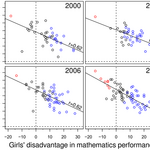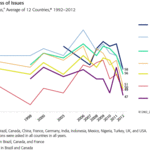
Though every election has high-profile female candidates and elected officials, a new paper conducted by American University Women and Politics Institute director Jennifer L. Lawless and Richard L. Fox of Loyola Marymount University says that young women are less likely than young men ever to have considered running for office, to express interest in a candidacy at some point in the future, or to consider elective office a desirable profession.
The survey used 2,100 college students and showed a gap between women and men's interest in running for office; men were twice as likely as…




